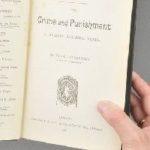First Edition Of ‘Crime And Punishment’ Turns Up In $17 Box Of Used Books
An anonymous woman in northwestern England purchased an auction lot of old secondhand books for £14. When she finally had time to go through the contents, she found the 1886 edition of the Dostoevsky novel, the first published in English. She has now made a 96,300% profit.
The relentless push to add connectivity to home gadgets is creating dangerous side effects that figure to get even worse. MIT Technology Review
Study Confirms: The More You Use Facebook, the Worse You Feel Harvard Business Review
The amazing story of Lal Bihari, founder of the Uttar Pradesh Association of Dead People, illustrates many of the issues I wrote about in my post on the chaos of land records in India.
When Lal Bihari first heard about his death, he thought it was a joke. He smiled at the lekhpal, the village officer responsible for land records. But there was no smile in return. “Lal Bihari died last year,” the lekhpal repeated. “I don’t know who you are.” That was when the 22-year-old from Amilo in Azamgarh, Uttar Pradesh (UP), realised something was amiss. He had come to his birthplace Khalilabad for residence, income and caste certificates. He needed them to get a bank loan for his handloom business.“But I am here before you,” he said, puzzled. “You know me. I have met you before.” The lekhpal showed him the land record, a piece of paper, and read it out. It said that the previous year, 30 July 1976, after the death of Lal Bihari, his one bigha (one-fifth of an acre) of land had devolved to his cousins. He was officially dead.
Lal’s cousins had bribed a local official and declared him dead in order to take his land. One would think it a fairly easy procedure to prove that you aren’t dead but even in the United States this can take months. In India, it took 17 years.
“The price of my death was Rs 300,” says Lal Bihari. After he discovered he had ‘died’, Lal Bihari went to a lawyer, who said, “A dead man has come to me,” and laughed. Neighbours would mock him—“Look, there goes the ghost.” He felt humiliated. Since a court case could take decades, he visited various government departments. He beseeched and quarreled with officials. He filed complaints. In vain. “The enquiry would be conducted by the very officials who had listed me as dead,” he says.
Finding no help from officials, Lal began to engage in more and more desperate measures:
In 1985, he tried to get himself arrested. He kidnapped his cousin, a boy named Baburam in the fifth standard, whose family had shown him dead. But once he picked up Baburam from school, he didn’t know what to do. “I took him to a movie every day,” he says. After five days, when the family did not file a police complaint, he decided to soak Baburam’s shirt in goat’s blood and send it over. “I thought it would scare them into going to the police,” he says. But the butcher he knew didn’t help and told him to go to the poultry seller. “The blood from a chicken was never going to be enough,” says Lal Bihari. He dropped the idea. The plan flopped, though Baburam got a new shirt.…He bribed a policeman Rs 500 to get a case registered against him and his cousin for rioting. The policeman returned the money when he discovered the motive. He applied for widow’s pension for his wife, Karami. “They would refuse because I was alive. This would be a record for me,” he says. But the government’s refusal made no mention of him.Next, Lal Bihari sold his property to contest the 1988 Lok Sabha election from Allahabad against former Prime Minister VP Singh. Surprising even himself, he got about 1,600 votes.
Lal’s bizarre case began to get newspaper attention and finally in 1994 he was once again declared alive and his property restored. The story, however, doesn’t end there. In his adventures, Lal had befriended many dead people and so he founded the UP Mritak Sangh, the Uttar Pradesh Association of Dead People. The association organizes marches of the walking dead. In 2003 Lal Bihari won the IgNobel peace prize.
Lal Bihari continues to be very much alive...
